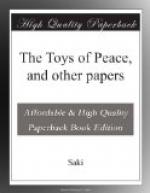“His supporters say it is up to us to provide the music,” said the Home Secretary; “they say we put him in prison, and it’s our affair to see that he leaves it in a respectable manner. Anyway, he won’t go unless he has a band.”
The telephone squealed shrilly; it was a trunk call from Nemesis.
“Poll opens in five minutes. Is Platterbaff out yet? In Heaven’s name, why—”
The Chief Organiser rang off.
“This is not a moment for standing on dignity,” he observed bluntly; “musicians must be supplied at once. Platterbaff must have his band.”
“Where are you going to find the musicians?” asked the Home Secretary wearily; “we can’t employ a military band, in fact, I don’t think he’d have one if we offered it, and there ain’t any others. There’s a musicians’ strike on, I suppose you know.”
“Can’t you get a strike permit?” asked the Organiser.
“I’ll try,” said the Home Secretary, and went to the telephone.
Eight o’clock struck. The crowd outside chanted with an increasing volume of sound:
“Will vote the other way.”
A telegram was brought in. It was from the central committee rooms at Nemesis. “Losing twenty votes per minute,” was its brief message.
Ten o’clock struck. The Prime Minister, the Home Secretary, the Chief Organiser, and several earnest helpful friends were gathered in the inner gateway of the prison, talking volubly to Demosthenes Platterbaff, who stood with folded arms and squarely planted feet, silent in their midst. Golden-tongued legislators whose eloquence had swayed the Marconi Inquiry Committee, or at any rate the greater part of it, expended their arts of oratory in vain on this stubborn unyielding man. Without a band he would not go; and they had no band.
A quarter past ten, half-past. A constant stream of telegraph boys poured in through the prison gates.
“Yamley’s factory hands just voted you can guess how,” ran a despairing message, and the others were all of the same tenour. Nemesis was going the way of Reading.
“Have you any band instruments of an easy nature to play?” demanded the Chief Organiser of the Prison Governor; “drums, cymbals, those sort of things?”
“The warders have a private band of their own,” said the Governor, “but of course I couldn’t allow the men themselves—”
“Lend us the instruments,” said the Chief Organiser.
One of the earnest helpful friends was a skilled performer on the cornet, the Cabinet Ministers were able to clash cymbals more or less in tune, and the Chief Organiser has some knowledge of the drum.
“What tune would you prefer?” he asked Platterbaff.
“The popular song of the moment,” replied the Agitator after a moment’s reflection.
It was a tune they had all heard hundreds of times, so there was no difficulty in turning out a passable imitation of it. To the improvised strains of “I didn’t want to do it” the prisoner strode forth to freedom. The word of the song had reference, it was understood, to the incarcerating Government and not to the destroyer of the Albert Hall.




